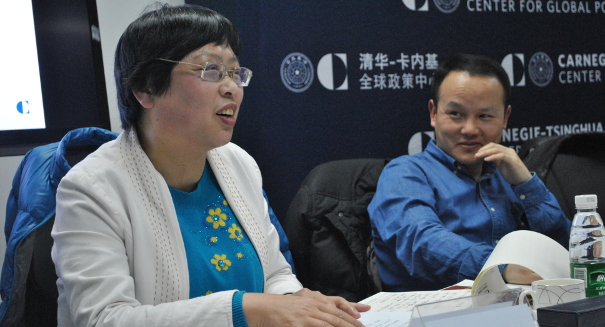Registration
You will receive an email confirming your registration.
In 2012, the eighteenth National Congress of the Communist Party of China proposed the concept of major-power diplomacy with Chinese characteristics as the framework for the country’s diplomatic engagement. In contrast with previous dictums of maintaining a low international profile, major-power diplomacy has entailed a more proactive diplomatic agenda. China has begun to act more assertively to shape the international environment through initiatives such as the Belt and Road and the Asian Infrastructure Investment Bank.
Carnegie–Tsinghua’s Zhang Lihua moderated a discussion with Chinese and international experts about the key features of China’s approach to major-power diplomacy and the motivations for this policy change. They also commented on how it has affected China’s foreign policy process and strategies in recent years.
Discussion Highlights
A Chinese Brand of Foreign Policy: Panelists described how Chinese foreign policy has evolved since reforms began in the late 1970s. With increased global interaction, Beijing has identified how its foreign policy is distinctive. Participants asserted that Chinese foreign policy is still designed to promote socialism with Chinese characteristics and the continued rule of the Communist party. Yet one panelist noted that China’s way of explaining its foreign policy to domestic and foreign audiences has shifted. Policymakers today are more likely to evoke traditional Chinese cultural concepts—such as kinship, sincerity, mutual benefit, and tolerance—rather than socialist values when discussing foreign policy decisions.
Diplomatic Centralization: Participants observed that the Communist Party Central Committee and leading small groups of top officials are playing a more active role in making foreign policy under Xi Jinping. State visits have become the primary vehicle for advancing the country’s foreign policy goals, taking on a role previously held by embassies. Since he took office in 2013, Xi has made high-profile visits to more than 60 countries, panelists pointed out. They predicted that the roles of established and emerging foreign policy institutions will continue to evolve to meet the future needs of Chinese diplomacy.
Complex, Issue-based Diplomacy: Panelists noted that the world is shifting away from clearly defined networks of allies and rivals toward a more complex environment that involves both cooperation and competition between the same states. China’s relationships with many countries consist of broad economic engagement and persistent security competition. As geopolitical interdependence has increased, China has framed its foreign policy decisionmaking increasingly in terms of its national interests on a case-by-case basis.
Engaging Neighbors More Actively: Panelists asserted that China is now approaching its diplomatic relationships with neighboring countries with a newfound energy and purpose. A key component of this policy shift is development assistance to regional partners through initiatives such as the Belt and Road initiative and the Asian Infrastructure Investment Bank. Chinese officials have claimed that its peaceful rise will facilitate growth in other countries, participants explained. They said that China is linking this model of international win-win cooperation to the Chinese Dream, a label for China’s ongoing modernization and national revitalization made popular by Xi Jinping. In doing so, panelists concluded, China is attempting to convince its neighbors that the country’s rise will help advance shared goals of prosperity and security for all.
Ongoing Challenges: Panelists acknowledged that Chinese foreign policymakers still face challenges. Foremost among them is how China will calibrate its diplomatic efforts to navigate the diverse expectations of both domestic and foreign audiences to ensure domestic stability and constructive relationships with other countries. Participants also pointed out that Beijing must continue to balance moral considerations and self-interest as it articulates its foreign policy vision. They observed that these tasks must be managed at a time when the country’s capabilities—and by extension policy choices—keep expanding and the number of stakeholders seeking to influence China’s foreign policy continue to grow.
Zhang Lihua
Zhang Lihua is a resident scholar at the Carnegie–Tsinghua Center for Global Policy and the director of the Center for European Studies in the Department of International Relations at Tsinghua University.
Yin Jiwu
Yin Jiwu is an associate professor in the School of International Relations and Diplomacy at Beijing Foreign Studies University.
Zhang Qingmin
Zhang Qingmin is a professor in the School of International Studies at Peking University.
Ma Xiaojun
Ma Xiaojun is a professor at the Institute for International Strategic Studies at the Central Party School of the Communist Party’s Central Committee.
Chen Xulong
Chen Xulong is a senior research fellow and director of the Department for International and Strategic Studies at the China Institute of International Studies.
Manuel Perez Garcia
Manuel Perez Garcia is an associate professor in the School of International Studies at Renmin University.
Fabian Bauwens
Fabian Bauwens is a researcher and lecturer in the School of International Studies at Renmin University.
